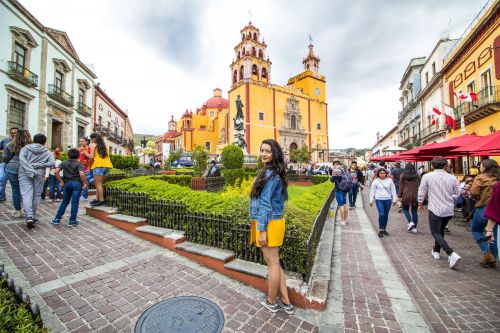Expanding DEI Resources in your Study Abroad Office
June 15, 2021

The following guest post offers the perspective of Elisabet Raquel García, a recent college graduate from a historically underserved background on a mission to serve those from a similar background.
While international travel may not be back in full swing just yet, many Study Abroad offices are preparing for the return to travel and opening up applications for future study abroad terms. As students enter the application process, international educators must make sure they have the appropriate resources to support all students looking for experiential learning opportunities.
Recently, Terra Dotta spoke with Elisabet Raquel García, a 2019 graduate of University of California, Santa Cruz (UCSC) and four-time scholar abroad. While the most common demographic for study abroad is a white female, García is a first-gen, low-income, and multicultural Latina.
During her time at UCSC, she was able to study abroad in Brazil, Mexico, and Chile to reconnect with her Latin American roots spread across the American continents, reunite with family members, and become fluent in Spanish through programs run by the University of California Education Abroad Program (UCEAP). Upon graduating from UCSC, she also had the privilege of participating in a program to reconnect with her roots offered by the Institute of Mexicans in the Exterior of the Mexican Federal government.

Unique to the University of California system, UCEAP is a very academically integrated program, allowing for easy credit transfer and for financial aid to apply towards abroad opportunities. The flexibility and accessibility of the program allowed García to embark on her first program in Brazil.
After she returned, García began working in the Study Abroad office as a peer advisor, dedicated to helping other historically underserved students access global learning opportunities. As García advised others about programs academically and financially available to them, she began to learn of other programs and scholarship opportunities herself. García applied to and was awarded several scholarships including the Gilman and Duttenhaver scholarship and continued on to study in Mexico and then on to complete a year-long program in Chile.
After spending two of her five years at UCSC abroad and advising a wide range of her peers about study abroad opportunities, García has since launched on an entrepreneurial path, dedicated to supporting historically underserved students by creating digital content that can be used by higher education institutions and international education organizations through her company: Access Equitable Education.
Taking Action: For Study Abroad Offices
When asked what advice García had for institutions as they seek to expand DEI resources, she commented that access to resources is paramount to student success. “Make sure you offer informational resources that take into consideration students’ diverse needs and identities, and make sure these resources are readily available to all students.”
During her final term with UCSC Global learning, García gave their website section on Student Identities, titled “Identities Abroad and Away” a complete overhaul and make-over full of accessible information for students of diverse identities. As a volunteer alumni, she is currently working with UCSC Global Learning to develop short videos to upload on their site to explain various resources and make the information even more accessible and digestible for all.
Secondly, García added that re-assessing an office’s statement of inclusion is important as well. “Make sure the statement admits your commitment to inclusion and also that your processes actively work towards that commitment. There is no point in making statements without taking the action that truly backs them up.”
Lastly, García called on her own experience as a peer advisor. “If your office has peer mentors, make sure that they are of truly diverse backgrounds. Listen to their ideas and trust that they know their peers best. In short, find diverse talent and trust in them to implement that talent. Your department will be blown away at just how much they are capable of.”
Advice: For Students
García had separate advice for students, “It’s never too early to plan. I had no intention of studying abroad multiple times, but I started doing research early and learned of all the opportunities that existed for me. The earlier you plan, the better the outcome.”
García added that it’s important to strategize, not only for the program application but also for scholarship applications. She even shared her own scholarship formula, which includes three key aspects:
Returning to Travel
As we near the full return to travel and re-enter standard application cycles, it’s important to affirm your commitment to inclusion and ensure students have access to resources, no matter their identity.
If you would like to learn more about Elisabet Raquel García or Access Equitable Education, García welcomes students and institutions to reach out to her with comments, questions, or to follow along with her content. Soon, Access Equitable Education will have a website up and running, until then please engage with her on the following platforms:
Instagram: @AccessEquitableEducation
TikTok: @AccessEquitableEducation
For more tips on expanding diversity in your study abroad programs, check out Terra Dotta’s E-Book: Diversity in Study Abroad; Why you need it and how to achieve it.